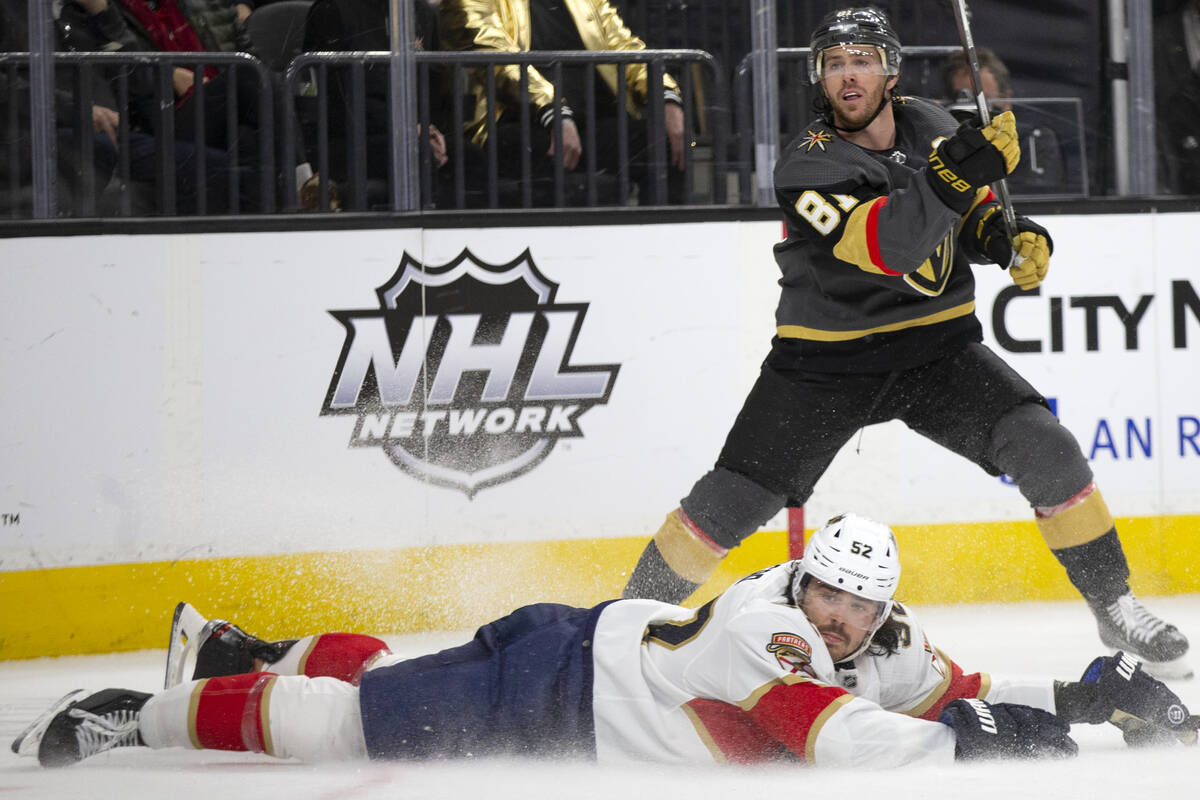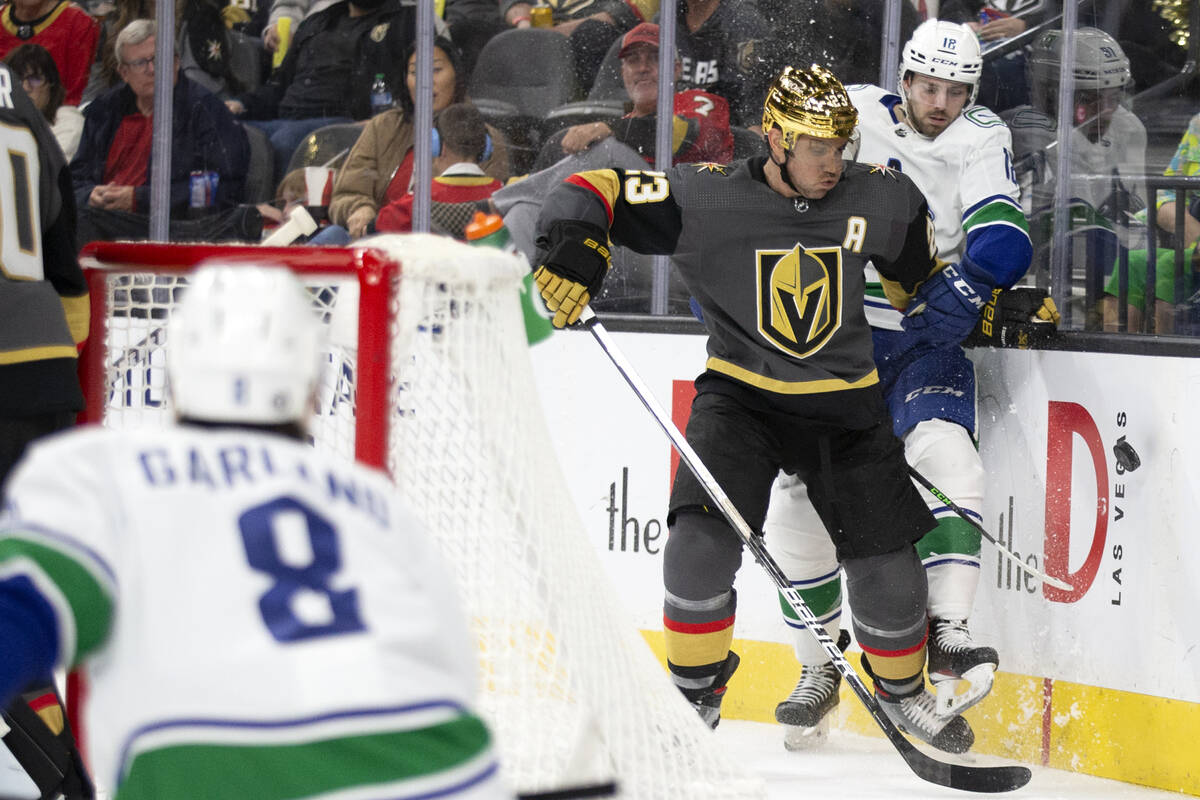How do Golden Knights regain their identity?
Jonathan Marchessault blames himself.
As one of the few remaining members from the Golden Knights’ inaugural season, the winger takes pride in upholding the principles that made the franchise an instant success.
But after the Knights missed the playoffs for the first time in their brief history, it was obvious they were never able to establish their identity.
Instead of the relentless, resilient bunch the NHL came to know in their first four seasons, the Knights crumbled under the weight of expectations and rarely resembled a physical, four-line team as injuries took a toll.
“Maybe it’s on a guy like me. Maybe guys that have been here since Year One, maybe we let it slip a little bit,” Marchessault said. “It’s on us as the veteran group that we have here to make sure that we’re hard to play against every night. I don’t think that we were this year.”
Since reaching the Stanley Cup Final in their inaugural season, the Knights made several high-profile additions in pursuit of a championship.
Those upgrades came at a cost, though, as many of the team’s most popular players were traded to make room under the salary cap.
The result this season was a team that lacked emotion, according to multiple players, and melted when the heat was turned up on the playoff race in the final month.
With many of the team’s most vocal leaders out of the lineup for prolonged stretches, there was a lack of camaraderie that was most evident in March when the Knights went 0-5 on a road trip through Philadelphia, Buffalo, Pittsburgh, Columbus and Winnipeg.
“We’ve kind of let that slip a little bit that we were just going to win maybe sometimes with great players,” captain Mark Stone said. “We’ve got to get back to having that killer instinct mindset, outwork your opponent. And then when you have the skill and the players we have, if you get that work ethic, it can be a tough team to beat.”
Before this season, the Knights were known as one of the league’s most physical teams. The fourth line, nicknamed the “Meat Grinders,” featured bruising wingers Ryan Reaves and William Carrier, and that trio often started games.
Reaves was traded to the New York Rangers in the offseason, and general manager Kelly McCrimmon said he envisioned a heavy fourth line of Carrier-Nicolas Roy-Keegan Kolesar coming out of training camp.
But that didn’t materialize until the final week of the season and lasted two periods, as Kolesar was injured and missed the final three games.
Instead, injuries forced those players to move up in the lineup, and the Knights opted to use more skilled forwards such as Brett Howden or rookies Jake Leschyshyn (41 games) and Jonas Rondbjerg (30 games) on the fourth line. Late in the season, they were forced to go with 11 forwards because of injuries and salary cap constraints.
While it paid off with timely goals before the All-Star break, the Knights sacrificed a physical presence that was difficult to replace.
“As a defenseman, there’s no harder thing to defend than speed,” Alec Martinez said. “But if you also have in the back of your mind that there’s going to be a line coming out there next that can put you in the first row eating nachos, that makes you think, right?
“Maybe gotten away from that a little bit, and we need to be able to bring that style back.”
The Knights also changed from an attacking 1-2-2 forecheck based on pressure to a counterattacking 1-1-3 that relied on creating turnovers in the neutral zone and then transitioning quickly into offense. The system was slow to take hold, and while it helped the offense early, the goals dried up in the final 35 games.
In addition, the Knights ranked 26th in high-danger chances allowed at even strength, according to NaturalStatTrick.com. A year after Robin Lehner and Marc-Andre Fleury combined to allow the fewest goals, the goaltending couldn’t make up for the defensive deficiencies.
“Every fan and everyone in this room knows Vegas hockey is quick, it’s physical,” defenseman Zach Whitecloud said. “It puts teams on their heels for a full 60 minutes. Obviously, we didn’t do that this year enough consistently.”
The Knights had a short turnaround after being eliminated from the playoffs by Montreal last June. Along with the heavy workload many players had to take on because of the injuries, that led to a lack of energy throughout the season.
With more than four months to recover, the Knights hope they can regain their identity entering training camp in the fall.
“What it looks like is we’re a four-line team that comes at you in waves, that plays with pressure and gets scoring from all four lines,” coach Pete DeBoer said. “We’re not far off it. And I think we’ve seen it here.”
Contact David Schoen at dschoen@reviewjournal.com or 702-387-5203. Follow @DavidSchoenLVRJ on Twitter.



















